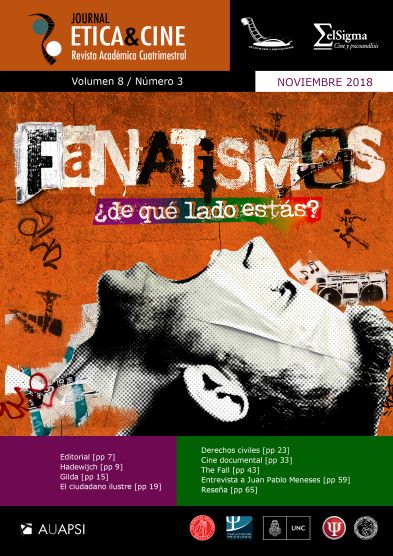Documentary film and genocide. Some ethical problem
DOI:
https://doi.org/10.31056/2250.5415.v8.n3.22772Keywords:
Documentary Film, Ethics, Genocide, RepresentationAbstract
This article is part of an investigation about the representation of genocides in documentary film. On this occasion, we will concentrate on exposing some ethical problems that may arise in the representation of genocide in documentary films. Documentary theorists such as Brian Winston, Carl Plantinga, and Bill Nichols have set out two main axes around ethics and documentary: the duties of the filmmaker towards the spectator –in terms of truth-falsehood– and towards the subjects represented. The analysis of this last direction leads to coincide those investigations with the analysis of the genocide studies; that is, the analysis of the “human element”. This article, then, proposes a cross between the analysis of the perpetrator-victimbystander theorized in the context of the genocide studies with those perspectives that have problematized in ethical terms the representation of people in Documentary film. Along the way, we will not only seek to deepen it but also explore what other roles documentary film can establish in the representation of various genocide cases.Downloads
References
Alvarez, A. (2001). Governments, citizens, and genocide: a comparative and interdisciplinary approach. Bloomington: Indiana University Press.
Baumeister, R. (1999). Evil. Inside Human Violence and Cruelty. Nueva York: W. H. Freeman and Company.
Burucúa, J. E., & Kwiatkowski, N. (2014). «Cómo sucedieron estas cosas». Representar masacres y genocidios. Buenos Aires: Katz.
Lanzmann, C. (2011). La liebre de la Patagonia. Buenos Aires: Seix Barral. Nichols, B. (2007). Cuestiones de ética y cine documental. Archivos de la Filmoteca, 57.
Plantinga, C. (2007). Caracterización y ética en el género documental. Archivos de la Filmoteca, 57.
Rees, L. (2005). The Nazis: A Warning from History. En T. Haggith & J. Newman (Eds.), Holocaust and the Moving Image. Representations in film and television since 1933. Londres: Wallflower.
Ruffinelli, J. (2005). Documental político en América Latina: un largo y un corto camino a casa (década de 1990 y comienzos del siglo XXI)”. En C. Torreiro& J. Cerdán (Eds.), Documental y vanguardia. Madrid: Cátedra.
Ternon, Y. (1995). El estado criminal. Los genocidios en el siglo XX. Barcelona: Península.
Waller, J. (2007). Becoming Evil. How Ordinary People Commit Genocide and Mass Killing. Nueva York: Oxford University Press.
Wieviorka, A. (2006). The Era of Witness. Ithaca: Cornell University Press.
Winston, B. (2005). Ethics. En A. Rosenthal & J. Corner (Eds.), New Challenges for Documentary. Manchester: Manchester University Press.
Downloads
Published
How to Cite
Issue
Section
License
Los autores que publiquen en Ética y Cine Journal aceptan las siguientes condiciones:
Los autores/as conservan los derechos de autor © y permiten la publicación a Ética y Cine Journal, bajo licencia CC BY-SA / Reconocimiento - Reconocimiento-CompartirIgual 4.0 Internacional. La adopción de esta licencia permite copiar, redistribuir, comunicar públicamente la obra, reconociendo los créditos de la misma, y construir sobre el material publicado, debiendo otorgar el crédito apropiado a través de un enlace a la licencia e indicando si se realizaron cambios.

Este obra está bajo una licencia de Creative Commons Reconocimiento-CompartirIgual 4.0 Internacional.




